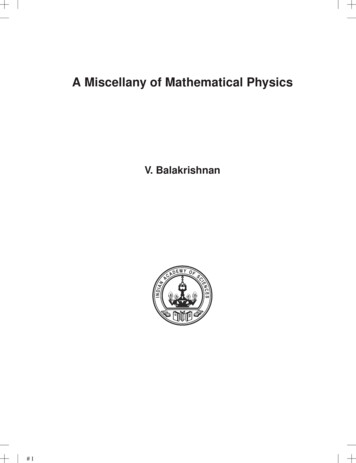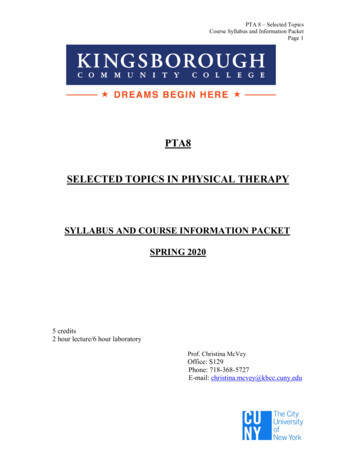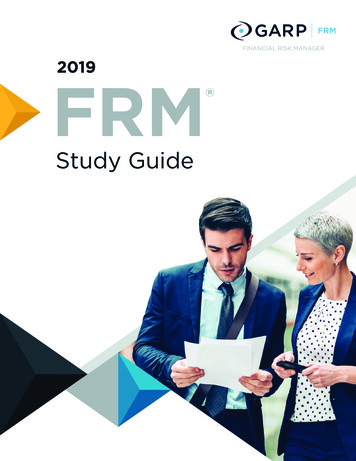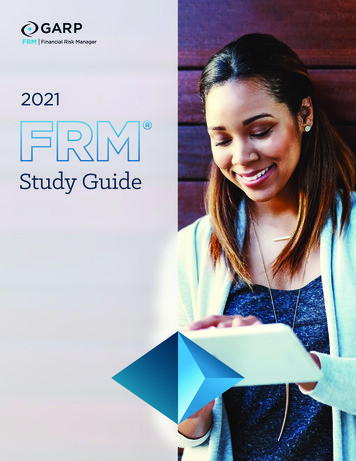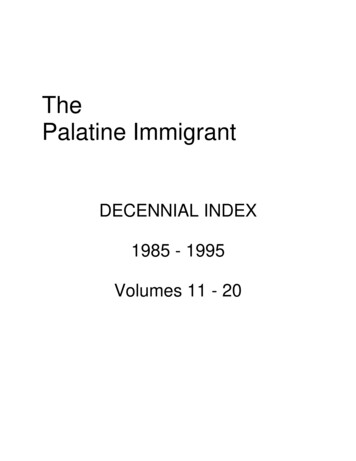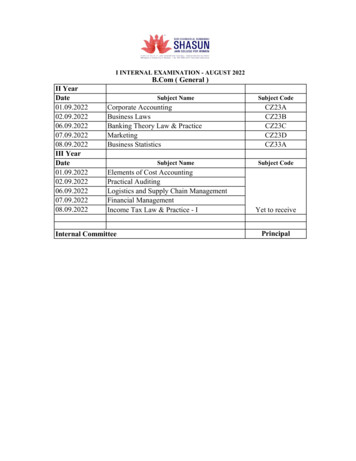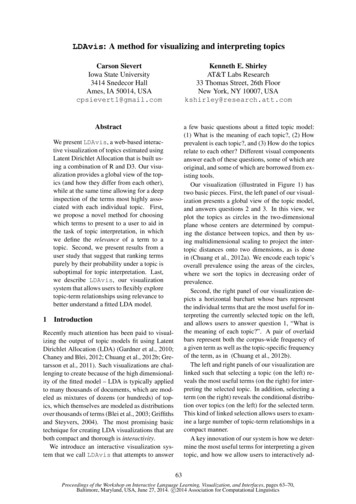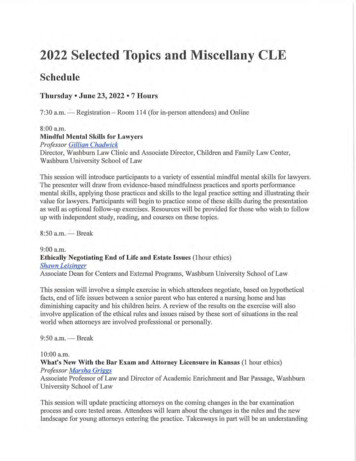
Transcription
2022 Selected Topics and Miscellany CLEScheduleThursday June 23, 2022 7 Hours7:30 a.m. -Registration - Room 114 (for in-person attendees) and Online8:00 a.m.Mindful Mental Skills for LawyersProfessor Gillian ChadwickDirector, Washburn Law Clinic and Associate Director, Children and Family Law Center,Washburn University School of LawThis session will introduce participants to a variety of essential mindful mental skills for lawyers.The presenter will draw from evidence-based mindfulness practices and sports performancemental skills, applying those practices and skills to the legal practice setting and illustrating theirvalue for lawyers. Participants will begin to practice some of these skills during the presentationas well as optional follow-up exercises. Resources will be provided for those who wish to followup with independent study, reading, and courses on these topics.8:50 a.m. -Break9:00 a.m.Ethically Negotiating End of Life and Estate Issues (1 hour ethics)Shawn LeisingerAssociate Dean for Centers and External Programs, Washburn University School of LawThis session will involve a simple exercise in which attendees negotiate, based on hypotheticalfacts, end of life issues between a senior parent who has entered a nursing home and hasdiminishing capacity and his children heirs. A review of the results on the exercise will alsoinvolve application of the ethical rules and issues raised by these so1i of situations in the realworld when attorneys are involved professional or personally.9:50 a.m. -Break10:00 a.m.What's New With the Bar Exam and Attorney Licensure in Kansas (1 hour ethics)Professor Marsha GriggsAssociate Professor of Law and Director of Academic Emichment and Bar Passage, WashburnUniversity School of LawThis session will update practicing attorneys on the coming changes in the bar examinationprocess and core tested areas. Attendees will learn about the changes in the rules and the newlandscape for young attorneys entering the practice. Takeaways in paii will be an understanding
of your ethical obligations in supervising this new generation oflawyers as they come to thepractice with a difference process and tested skill set.10:50 a.m. -Break11:00 a.m.Land and Water 101 ("LAW 101 ")Professor Burke W GriggsAssociate Professor of Law and Associate Director of the Oil and Gas Law Center, WashburnUniversity School of LawThis presentation provides an overview of water law issues that most frequently arise within realestate transactions and disputes. Topics include: the property interest in water rights; obtainingwater rights; common conveyancing issues; and problems of water scarcity.11 :50 a.m. -Lunch Break (on your own)1:00 p.m.Recent Developments in United States Supreme Court Cases, Paii IProfessor Jeffrey D. JacksonDirector, Center for Excellence in Advocacy, Washburn University School of LawThis session will walk through all of the decisions of the United States Supreme Court over thepast year. The presenter will bring his insight into trends and approaches the Court has beentaking to the myriad issues that they are choosing (and choosing not) to hear. A focus will be onthe rules that are coming out that are consistent and that are changing in these cases.1:50 p.m. -Break2:00 p.m.Recent Developments in United States Supreme Court Cases, Part IIProfessor Jeffrey D. JacksonDirector, Center for Excellence in Advocacy, Washburn University School of LawA continuation of the previous session to finish covering all of the Supreme Court cases of thepast year.2:50 p.m. -Break3:00 p.m.Regulating Artificial Intelligence: Who, What, When, Where, Why & HowProfessor David RubensteinJames R. Ahrens Chair in Constitutional Law and Director, Robert J. Dole Center for Law andGovernment, Washburn University School of Law
Recent advances in artificial intelligence are disrupting every major market and facet of sociallife. CmTently, the development and deployment of AI systems is virtually umegulated. Butregulation is assuredly on the horizon. This session will provide an overview and unpack a set ofknotty policy questions arising at the intersection of law, society, and technology. Topics willinclude who, what, when, where, why, and how to regulate AI in ways that can harness thetechnology's many benefits while mitigating its significant risks of harm.3:50 p.m. -Adjourn
6/20/20221
6/20/2022\!\That have athleticstaught n1e aboutbeing a lc:n,vyer?--Perlimnance-lVlental SkillsGro 1m lcti 111 S p a,ts7.I P,ychologi- I. "··1. -· ,: :,\,r. .2
6/20/2022,l n.c:r6uldse 11 1lt1VltytoS 3
6/20/2022Effocts of Unmanaged Stress Ill ness Poo r pe rfo rmance Addi ctio n Ethica l la pses Burn o ut Poo r clie nt o utcomesYou can' t stopLile wa\'es, butvm I can leal'IIhow to surl'Jon K:i.b:u-ZinnPedc rrnance 1\,Jenlal Skills Growth Mind set G r at itude Pos itive SelfTalk Tr ust in Process Visua li zation Relaxation4
6/20/2022l. Growth Mindset A belief that one's talents can be develo filj throughhard work, good strategies, and input from othersFixed Mindset v. Growth MindsetFIXED MINDSETGROWTH MINDSET "I've always been terrible atpublic speaking." "I can improve my publicspeaking through study andpractice." "I'm so disorganized! I'mhopeless!" "I am setting a goal to getmore organized using proventechniques that I can learn."FiJ,ed l\1lindset 11'iggers Challenges Criticism Comparison5
6/20/20223. Visualization People who imagine themse lves performing a task,improve their performance in that task (withoutphysically doing anything)6
6/20/20224. Gratitude Research overwhelmingly shows that gratitude ispositively associated with well-being7
6/20/2022\i\That is Minclfu]ness?I.Paying Attention2.On Purpose3.In the Present Moment4.Without JudgmentQualities of Nlindfulness Enhanced awareness An innate capacity for coping, thriving, and choosing well A way of being with whatever arises, however it isBenefits of lV[indfulness in Legal Practice Attorney well-being Ethical compliance Competence/performance Conflict reduction Client satisfaction Stress management8
6/20/20229
6/20/202210
Ethically Negotiating End ofLife and Estate IssuesThis CLE session will blend an initial live “online” negotiation exercise withdiscussion and application of ethical issues and related rules arising out ofthat exercise. The initial exercise will involve an online initialmeeting/negotiation based on hypothetical facts that will be shared with thegroup as a whole and party specific confidential facts that have been sentto the participants in advance.Participants will be randomly paired off for the first part of the session tonegotiate and will be brought back after about 15 minutes.We will then walk through the results of the exercise as they relate to theapplicable legal ethical rules. Participants will be challenged tocontemplate whether they feel they complied ethically or may need toadjust their style and negotiation tactics.
Presented by:Shawn Leisinger, J.D.Associate Dean for Centers and External ProgramsExternship Program DirectorWashburn University School of Law1700 SW College - Suite 331CTopeka, Kansas 66621(785)-670-2464(785)-670-2462 faxshawn.leisinger@washburn.edu
Initial Thoughts and DirectionsAs you approach the exercise try to adopt the roleyou are assigned. After the exercise, initialdiscussion will focus on whether you took acooperative or competitive approach both in regardsto style and content. We will also discuss whetherbeing collaborative in working through the variousoptions and solution scenarios affected the outcomeof the negotiation. The common information hasbeen provided to you as well as confidential info forthe sides.
Common InformationNegotiation Skills ProblemCarl Cook Estate – Ann and Bob Kids - Common InformationAt this time, as participants in this exercise, you are being asked onbehalf of your respective client to have an initial meeting to discussnext steps in a dispute between them. Given the current limitations dueto the Covid-19 pandemic you have opted to initially discuss the mattervia Zoom, an online communication platform that has become popular.You have been provided two sheets of confidential facts andmotivations for the two sides of this matter and will be put into roomswith two or possibly three participants. Once in the room decide whichparty you want to represent (if three in the room two can work togetheron one side) and give each other a few minutes to review theconfidential facts only for that side.Once you are ready, proceed to negotiate based on the facts andmotivations you have been provided. You will be automatically pulledback from your breakout rooms after about 15 minutes so work throughyour problem with that time limit in mind.
Common InformationAt this time Carl Cook is 85 years old and has been in a nursing homefor about a year. Carl went in to the home as his own choice as he wasno longer able to care for himself and address his own basic healthneeds even with the help of an assistant who came in three days aweek to cook, clean and provide other services. Carl has two livingchildren as his only immediate heirs, Ann and Bob. Ann has alwayslived in a town about two hours away and she travelled to visit Carl asoften as she could. Bob moved to the other end of the state, about asix hour drive, about 5 years ago for a job. Ann has always helped Carlwith his finance and health decisions and thus now has a full Power ofAttorney for all business and health matters for Carl. Bob was nevergreat with money and it is openly known that Carl gave him around 20,000 when Bob moved for his new job to help him get out fromunder multiple debts and get a fresh start short of filing bankruptcy.
Common InformationCarl did well in life and has about 100,000 in the bank. He still ownshis 20 acre farm and a neighboring property of 20 acres with a largepond and cabin that Bob helped him build years ago. Under the lastwill Carl had written (about ten years ago) he gives the cabin/pondproperty to Bob if still owned at his death. Carl now is advancing withdementia and has good and bad days where his capacity comes andgoes. Ann has been spending a lot more time taking care of Carl’sbusiness and health decisions. Bob has made little effort to even calland talk to Carl more than once a month. Bob got a call from aneighbor last week who told him that Ann had listed the cabin/pondproperty for sale and he immediately called Ann who told him that hecould talk directly to her attorney (Attorney A) as she had POA andauthority to sell what was necessary to raise cash to cover Carl’ssubstantial nursing home expenses. Bob retained an attorney(Attorney B) who has set this meeting to initially talk to Attorney A aboutthe matter.
Issues To Discuss?Sale of the cabin/pond property?Existing will/capacity/new will?Other issues?
Let the Games Begin!The negotiation will last for approximately 15to 20 minutes. Be prepared to brieflyrespond with your approach, style and yourresults from the negotiation.
Negotiation Wrap UpWhat were your negotiation results?
Negotiation Wrap UpDid you get what you needed for your client?
Negotiation Wrap UpDid you give up more than you wanted to?
Negotiation Wrap UpDid your competitive lawyer come out?
Negotiation Wrap UpDid you work to collaborate and develop awin/win negotiation process and result?
Negotiation Wrap UpDid you mislead or hold back information orfacts to get a better outcome?
Negotiation Wrap UpHow did the coins/pocket watches collectionissues play out?
Negotiation OnlineGiven the current status of Covid 19 andlegal practice from a distance manynegotiations are done online. We will touchon some considerations if this problem wasundertaken online rather than in person.
Online Ethical Rules?Rule 1.1 - CompetenceA lawyer shall provide competent representation to aclient. Competent representation requires the legalknowledge, skill, thoroughness and preparationreasonably necessary for the representation.Comment [8] To maintain the requisite knowledge andskill, a lawyer should keep abreast of changes in thelaw and its practice, including the benefits and risksassociated with relevant technology, engage incontinuing study and education, and comply with allcontinuing legal education requirements to which thelawyer is subject.
Online NegotiationConsiderations As you negotiated today do you feel that theonline format affected your interpreting bodylanguage and reading the otherparty/attorney and their responses. Does the online approach alter yourwillingness to take a break and meet withyour client as facts develop? Can you read the eyes via the online“headshot”? Do you use and trust the “mute” button?
Online Negotiation Security Consider a VPN or virtual private networkthat allows online authentication and networkaccess. Ethical obligation to stay on top of currenttech limitations and issues? Subscribed to Zoom versus free versions? Online communication resources – earlyconcerns that have largely been 0/keep-uninvited-guests-out-of-your-zoom-event/
More Online Ethical RulesRule 1.4 - Communication(a) A lawyer shall keep a client reasonably informed about the status of amatter and promptly comply with reasonable requests for information.(b) A lawyer shall explain a matter to the extent reasonably necessary to permitthe client to make informed decisions regarding the representation.Comment [2] Adequacy of communication depends in part on the kind of adviceor assistance involved. For example, in negotiations where there is time toexplain a proposal, the lawyer should review all important provisions withthe client before proceeding to an agreement. In litigation a lawyer shouldexplain the general strategy and prospects of success and ordinarily shouldconsult the client on tactics that might injure or coerce others. On the otherhand, a lawyer ordinarily cannot be expected to describe trial or negotiationstrategy in detail. The guiding principle is that the lawyer should fulfillreasonable client expectations for information consistent with the duty to act inthe client's best interests, and the client's overall requirements as to thecharacter of representation.
Online Ethical Rules?Rule 4.1 - Transactions with Persons other than Clients: Truthfulness in Statements to OthersIn the course of representing a client a lawyer shall not knowingly:(a) make a false statement of material fact or law to a third person; or(b) fail to disclose a material fact to a third person when disclosure is necessary to avoidassisting a criminal or fraudulent act by a client, unless disclosure is prohibited by or madediscretionary under Rule 1.6.Kan. R. Rel. Disc. Att. 4.1Comment Misrepresentation [1] A lawyer is required to be truthful when dealing with others ona client's behalf, but generally has no affirmative duty to inform an opposing person of relevantfacts. A misrepresentation can occur if the lawyer incorporates or affirms a statement ofanother person that the lawyer knows is false. Misrepresentations can also occur byfailure to act. Statements of Fact [2] This Rule refers to statements of fact. Whether aparticular statement should be regarded as one of fact can depend on the circumstances.Under generally accepted conventions in negotiation, certain types of statements ordinarily arenot taken as statements of material fact. Estimates of price or value placed on the subject of atransaction and a party's intentions as to an acceptable settlement of a claim are in thiscategory, and so is the existence of an undisclosed principal except where nondisclosure of theprincipal would constitute fraud. Fraud by Client [3] Paragraph (b) recognizes that substantivelaw may require a lawyer to disclose certain information to avoid being deemed to haveassisted the client's crime or fraud. The requirement of disclosure created by this paragraph is,however, subject to the obligations created by Rule 1.6.
What about negotiation generally in the Kansas Rules ofProfessional Conduct?There is no truly simple answer to this question. The Preamble to the Rulesprovides,“PREAMBLE: A LAWYER'S RESPONSIBILITIES[1] A lawyer, as a member of the legal profession, is a representative of clients,an officer of the legal system and a public citizen having special responsibilityfor the quality of justice.[2] As a representative of clients, a lawyer performs various functions. Asadvisor, a lawyer provides a client with an informed understanding of theclient's legal rights and obligations and explains their practical implications. Asadvocate, a lawyer zealously asserts the client's position under the rules of theadversary system. As negotiator, a lawyer seeks a result advantageous tothe client but consistent with requirements of honest dealing with others.As an evaluator, a lawyer acts as evaluator by examining a client's legal affairsand reporting about them to the client or to others.” (Emphasis added.)
The Preamble to the Rules continues,“[3] In addition, there are Rules that apply to lawyers who are not active inthe practice of law or to practicing lawyers even when they are acting in anonprofessional capacity. For example, a lawyer who commits fraud inthe conduct of business is subject to discipline for engaging in conductinvolving dishonesty, fraud, deceit or misrepresentation. See Rule 8.4.”Emphasis added.So even a lawyer engaged in a non-traditional practice of law in a businesssetting may well have a heightened ethical obligation due to his or her status asa licensed attorney in Kansas. In essence all lawyers at all times are governedby an ethical duty to avoid, “ dishonesty, fraud, deceit ormisrepresentation.”This higher standard for attorneys makes an evaluation of ethical negotiationespecially important and bears close contemplation of the remaining issuesraised in this presentation and the broader materials provided.
What does the average Kansas lawyer understand tobe his or her duty to “ethically” negotiate on behalf ofhis or her client?When you ask most lawyers what their ethical duties are in generalpractice they will immediately talk about the Kansas Rules ofProfessional Conduct in general, most often raising the a duty to“zealously” represent the client, the duty to communicate and to let theclient make appropriate decisions about the representation and thegeneral duty to be honest and forthright with the Court and othersinvolved in any particular representation.When you ask about the ethical duties of a lawyer as they relate tonegotiation, however, they generally have to pause for a bit and thinkabout it. Not because they are by nature unethical when they serve ina role as negotiator, but more often because they think about ethicalpractice in the area of negotiation in the same way that past Courts haddefined concepts of obscenity or pornography in the past, in essence,“Well, I know it when I see it!”
“Puffing and Bluffing”As a general rule most lawyers understand the general ethical rule tobe that you cannot lie in a negotiation and that it is permissible to “puff”or “bluff” or generally only say or respond to what you are directlyasked by opposing counsel.With law students, this same basic ethical knowledge can be found aswell, but law students very quickly get flustered when you ask themabout the competing issues of candor towards the court and the legalconcepts in both civil and criminal law of “fraud” and“misrepresentation”.The underlying conflict is that “advocacy” in the negotiation contextwould appear to be in conflict with the need to be honest and forthrightin the exchange with the other party, whether through counsel or not, inthe process of negotiating a settlement, plea or contract.
What rules apply to lawyers as they engage in the legal role ofnegotiator?The central guideline or concept raised in this area isthat you cannot engage in fraud. Under the KansasRules of Professional Conduct, Rule 1.0Terminology, the definition of that “Fraud” standardthat I have raised is found, the Rule provides,“(e) "Fraud" or "Fraudulent" denotes conductthat is fraudulent under the substantive orprocedural law of the applicable jurisdiction andhas a purpose to deceive.”
What do we mean by fraud and misrepresentation in thecontext of legal negotiation then?Isn’t the very purpose and role of a negotiation to deceive atleast to some degree? Don’t we try to closely guard just howmuch our client is willing to accept or what they might be willingto pay to settle the matter? Don’t we bluff a bit on what impactparticular facts or issues really might have on subsequentlitigation? Don’t we try to avoid answering fairly direct questionsand instead shift the focus to issues or facts that are moreadvantageous to our client and his or her position? At a basiclevel however, by plain language, fraud is both that intent todeceive as well as conduct that is fraudulent as defined by thesubstantive and procedural law of our jurisdiction. That said, thegenerally accepted “puffing“ and “bluffing” concepts are carvedout of those substantive and procedural fraud provisions as theyapply to negotiation for lawyers.
In the case of TRANSACTIONS WITH PERSONSOTHER THAN CLIENT, we find the core direction oftruthfulness as it applies to negotiation.This is the central “false statement of a material fact” evaluation.Rule 4.1 Truthfulness in Statements to Others, provides that, “Inthe course of representing a client a lawyer shall not knowingly:(a) make a false statement of material fact or law to a thirdperson; or(b) fail to disclose a material fact to a third person whendisclosure is necessary to avoid assisting a criminal or fraudulentact by a client, unless disclosure is prohibited by or madediscretionary under Rule 1.6.”Thus the issues of misrepresentation and fraud are clearly aconcern as lawyers “puff” and “bluff” in a negotiation.
Confidentiality Issues in GeneralRepresentation as Opposed to ProvisionsSpecific to Negotiation.Under Rule 1.6 Confidentiality of Information, pertinent sectionsprovide, “(a) A lawyer shall not reveal information relating torepresentation of a client unless the client consents after consultation,except for disclosures that are impliedly authorized in order to carry outthe representation, and except as stated in paragraph (b).(b) A lawyer may reveal such information to the extent the lawyerreasonably believes necessary: (2) to comply with requirements of law or orders of any tribunal; ”.Are we always fully aware of how much our client is willing to share andhow far they are willing to go in the dynamic negotiation process to getto a settlement? Are fraud considerations part of the “requirements oflaw” ?
Is there any particular guidance in regard to whatdisclosure is actually allowed in live negotiations?Under K.R.P.C. Rule 226 1.6 Client-Lawyer Relationship:Confidentiality of Information, the general confidentialityprovisions are found. Under the comments section and underthe heading “Authorized Disclosure”, Comment 6 provides, “Authorized Disclosure[6] A lawyer is impliedly authorized to make disclosures about aclient when appropriate in carrying out the representation, exceptto the extent that the client's instructions or specialcircumstances limit that authority. In litigation, for example, alawyer may disclose information by admitting a fact that cannotproperly be disputed, or in negotiation by making adisclosure that facilitates a satisfactory conclusion.
What if our client wants to move forward with somethingmore than “puffing and bluffing”?Under Rule 1.16 Declining or Terminating Representation, we find a veryimportant provision that requires withdrawal of representation if the lawyer findsthat the client continues to move forward with behavior that is fraudulent.It provides in pertinent part, “(a) Except as stated in paragraph (c), a lawyershall not represent a client or, where representation has commenced, shallwithdraw from the representation of a client if: (4) the client persists in a course of action involving the lawyer's servicesthat the lawyer reasonably believes is criminal or fraudulent.”. Emphasisadded.This gets at that initial basic concept that a lawyer may not engage in “fraud”either directly, or as an agent of the client, in the process of negotiation andrepresentation. Those ideas of “puffing” and “bluffing” become much moreconcerning when you have to continually think about where the line might be inregards to a material (mis)representation especially if the client is at thenegotiation and starts to provide any additional questionable information orrepresentations in the process.
Duty to Report Fraud orMisrepresentation?MAINTAINING THE INTEGRITY OF THE PROFESSION under Rule 8.3Reporting Professional Misconduct, “(a) A lawyer having knowledge of anyaction, inaction, or conduct which in his or her opinion constitutes misconductof an attorney under these rules shall inform the appropriate professionalauthority.” And also in Rule 8.4 Misconduct, “It is professional misconduct for alawyer to: (b) commit a criminal act that reflects adversely on the lawyer'shonesty, trustworthiness or fitness as a lawyer in other respects; (c) engage inconduct involving dishonesty, fraud, deceit or misrepresentation; (d)engage in conduct that is prejudicial to the administration of justice; (e) state orimply an ability to influence improperly a government agency or official; or(g) engage in any other conduct that adversely reflects on the lawyer's fitnessto practice law.” Emphasis added.Needless to say, all of those issues are raised when we come back to thequestion of at what point in negotiation “puffing” and “bluffing” move intomisrepresentation and on to fraud of the contractual or criminal variety. Theconcepts and categories raised in the sections of Rule 8.4 could very easily beinterpreted to cover what would otherwise be expected “zealous advocacy” bya lawyer in a negotiation.
So why do collaborative or cooperative negotiationapproaches make more sense than adopting a competitive orcontentious negotiation style?A collaborative or cooperative approach to negotiation contemplatesthat the parties have a mutual interest in settling the matter and ofteninvolves the concept that, as opposed to win/lose results found intraditional competitive negotiation, there can be win/win scenarios. Youmay have heard of this approach in the civil arena of negotiations as“finding creative ways to increase the size of the pie”.While our clients may often be looking at the simple dollars and centsof the settlement check, whether it is to be written or received, bringingin the associated considerations of time, effort and stress of protractedlitigation often will get both sides in a settlement mentality. Beyondthat, especially in contractual matters, the parties will have to continueto work together in the relevant business relationship after the attorneyshave moved on to other representations and clients.
Continued thoughts Beyond those more concrete considerations, a collaborative mutuallyacceptable negotiated settlement of a matter, or plea in a criminal case,serves multiple base line goals of the parties in having a simple andquicker resolution of the case, avoiding the protracted costs associatedwith moving forward to a trial, protecting the relationships of the partiesas they move forward, and having a settled agreement that both partiesare willing to actually sign off on and follow through on after the matteris done.From a lawyer’s perspective, clients that come out of the collaborativenegotiation process are comfortable with the result. They do not seeclients returning to get an unbalanced deal either enforced or rescindedin some manner or form. They do not see clients that routinely blamethe attorney for not getting an agreement that was reasonable and theparties could actually comply with. They understand that they werepart of solving the issues and have a vested interest in making thesolution work long term.
Final Thoughts/Questions?Most importantly, they may be willing to notraise the question of whether any of the “puffingand bluffing” engaged in the settlement processrose to the level of the contemplatedmisrepresentation or fraud!If the issue is not raised then the ethicscomplaint will not be made and you can avoidbeing the “precedent case” in regards to wherethe line in ethical negotiation in Kansas shouldbe drawn.
Organization as Client?Under Rule 1.13 Organization as Client, we find even more potential issues fora negotiator representing an organization, Rule 1.13 provides, “(a) A lawyeremployed or retained by an organization represents the organization actingthrough its duly authorized constituents.(b) If a lawyer for an organization knows that an officer, employee or otherperson associated with the organization is engaged in action, intends to act orrefuses to act in a matter related to the representation that is a violation of alegal obligation to the organization, or a violation of law which reasonably mightbe imputed to the organization, and is likely to result in substantial injury to theorganization, the lawyer shall proceed as is reasonably necessary in the bestinterest of the organization. In determining how to proceed, the lawyer shallgive due consideration to the seriousness of the violation and itsconsequences, the scope and nature of the lawyer's representation, theresponsibility in the organization and the apparent motivation of the personinvolved, the policies of the organization concerning such matters and anyother relevant considerations. Any measures taken shall be designed tominimize disruption of the organization and the risk of revealing informationrelating to the representation to persons outside the orga
Jun 23, 2022
